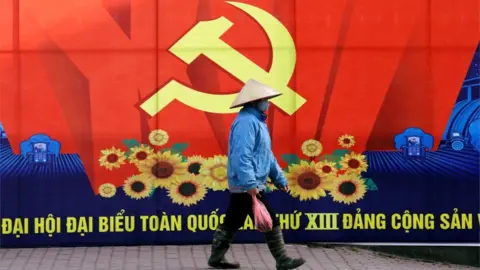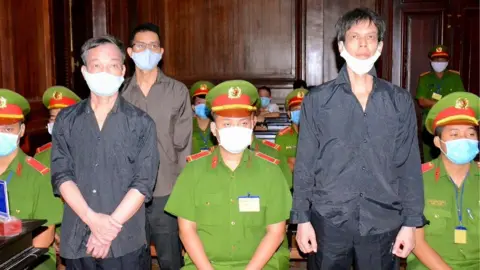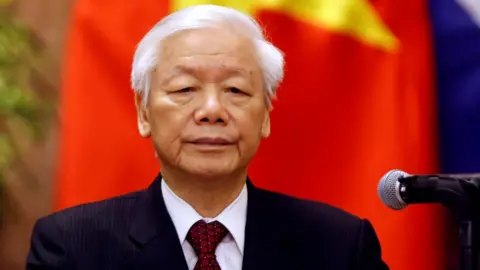Vietnam's party congress picks new communist leaders
 Reuters
ReutersVietnam's political elite is gathering to choose the country's leadership for the next five years amid a largely successful battle against Covid-19 and a booming economy.
In most other countries, we'd look at something along the lines of a general election.
But Vietnam has a communist government, and leadership is done differently.
Think of the tightly choreographed political theatre one sees at China's or North Korea's party congresses, and you get the idea.
Vietnam is a lot like that, albeit slightly more low-key.
Why is Vietnam important?
The country is one of Asia's fastest growing economies and a linchpin of stability in the region. Like China, it's essentially a booming capitalist powerhouse underneath a communist cloak.
The government has successfully established ties with both China and the US, putting the country into a very good strategic position.
Economically, Vietnam has good relations with both of those superpowers - and the current trade dispute between Beijing and Washington has put it into an even better position.
Many multinationals now operate in Vietnam, including global tech giants like Apple and Samsung.
It's also the only country in South East Asia which managed to minimise the economic damage from Covid-19 and managed moderate growth during the past year.
 Reuters
ReutersMilitarily, the country is also delicately walking the line between China and the US. It's fought wars against both of them but in recent years has been at odds particularly with Beijing over conflicting claims in the South China Sea.
How is Vietnam governed?
Unlike China or North Korea, the country does not have a single strongman at the helm. There are four main jobs that collectively are running the show: The Communist Party General Secretary, the Prime Minister, the President and the Chair of the National Assembly.
The vote for those four jobs moves upward along a pyramid. Every five years, about 1,600 delegates vote some 200 members into the Central Committee. That committee then picks the politburo of about 20. Out of those, the four top jobs are nominated.
While this reads like a democratic process from the bottom up, there's usually extensive political manoeuvring beforehand and the selections are predetermined.
Crackdown on dissent
Just as the political changeover is tightly controlled and managed, so is anything seen as criticism of the authorities.
That's nothing new in Vietnam - it is, after all, a one-party state with no real media freedom.
Yet over the past months there's been a renewed crackdown on dissent. Amnesty International and news agency Reuters both said there'd been a record number of political prisoners and longer jail terms for activists.
 AFP
AFPEarlier this month, three freelance journalists were found guilty of spreading anti-state propaganda and received 11 and 15 years in prison. This intensified grip on dissent can in part draw on a special military cyber unit, called Task Force 47, which since 2018 has been targeting criticism online.
"Most of those arrested are writers and activists who use social media - particularly Facebook - as the platform," explains Nguyen Khac Giang, Vietnam researcher at the Victoria University of Wellington.
"The situation will get tougher for critics as the government seems determined to crack down any signs of online activism."
So who will take the helm?
Out of the four top jobs, the General Secretary is the most important one.
Currently, the person holding that job is 76-year old Nguyen Phu Trong. He's serving his second term after receiving an exemption to contest as he was above the age limit of 65.
That should have made it unlikely he would run again - but over the weekend, the four appointees were leaked and widely circulated across Vietnamese media: Mr Trong is set to stay for a third term.
He is known for his "blazing furnace" war against corruption launched in 2016, which saw many high-ranking officials including a Politburo member sent to jail.
 Reuters
ReutersYet even a leadership change would hardly have sparked any sharp changes in direction. "Vietnam is a highly institutionalised authoritarian regime - major decisions are made based on consensus of all leaders," Nguyen Khac Giang explains.

"The dilema of the old leadership in a young society"
Nguyen Giang, BBC Vietnamese
The 13th Congress of the Communist Party of Vietnam began with a show of force by anti-riot police marching through the streets of Hanoi last week.
However, there is no serious threat to the ruling party of five million members which seems in full control of the country's future for at least the next 10-15 years. Whether it can keep its socialist ideals alive that long remains to be seen.
Over the next decade, the country has a good chance of maintaining its booming economy, able to compete with neighbouring nations. It has already managed the pandemic quite well, with its economy one of the few to show a positive growth rate for 2020.
And the leadership seems to understand that.
They are determined to stay on, despite their old age. This is despite them saying they want all new MPs for the Vietnamese parliament to be under 55, and females under 50. It seems they want to make sure the country will get a younger, more creative leadership - just not yet.

What are the challenges?
The new leadership will have to look at the crucial next five years. The global pandemic is expected to pull much of the world into a recession and Vietnam will try to retain its growth.
Just late last year, the growth target for 2021 was set at an ambitious 6.5%. In 2020, it had slowed to 2.9%, the lowest level in more than 30 years - but the country is still doing better than most of the rest of the world.
Last year's slower growth was of course largely due to the pandemic, and it seems certain that 2021's growth will again be held back by the virus.
Vietnam will continue to seek an economic and geopolitical balance between China and the US.
China's aggressive stance is expected to push Hanoi to continue looking towards the US. And if the trade conflict between Washington and Beijing continues, Vietnam will likely also continue to profit from that.
